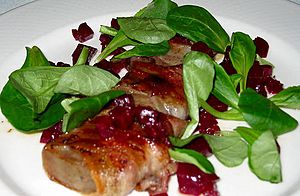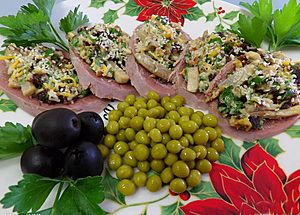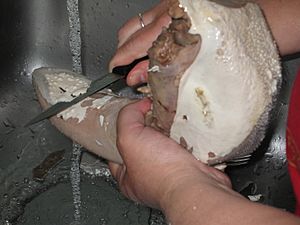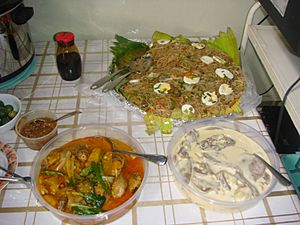Beef tongue facts for kids
Beef tongue is a type of meat that comes from a cow's tongue. It is also called neat's tongue or ox tongue. People can cook it in many ways, like boiling, pickling, roasting, or braising it in a sauce.
This food is popular in many countries around the world. For example, in Mexico, it's often used as a filling for tacos. In the United States, it's sometimes served on open sandwiches. In France and Belgium, it might be served with a special sauce called Madeira sauce. In some Eastern European and Jewish dishes, it's eaten with chrain, which is a type of horseradish sauce. Germans often prepare it with a white sauce that includes vinegar and capers, or with a creamy horseradish sauce. This horseradish cream is also popular in Polish cuisine.
Beef tongue has a lot of fat, which gives it most of its calories. Countries like Canada, especially the province of Alberta, export a lot of beef tongue to other parts of the world.
How to Prepare Beef Tongue

One common way to prepare beef tongue is to season it with onion and other spices. Then, it's placed in a pot and boiled until it's cooked through. After cooking, the outer skin is carefully removed. Sometimes, people use tongue that has already been pickled, which means it's already seasoned and ready to cook. If the tongue is cooked in a sauce, that sauce can sometimes be used again for other foods like meatballs.
Another method is to quickly dip the tongue in hot water to help remove its skin. After the skin is off, the tongue can be roasted in an oven. The juices that drip from the tongue during roasting can be used to make a tasty gravy.
Popular Dishes with Beef Tongue

In North America, beef tongue is a main ingredient in a dish called tongue toast. This is an open-faced sandwich that people eat for breakfast, lunch, or dinner. It can also be served as a small appetizer before a meal.
Beef tongue is very popular in Mexican cuisine. You will often find it in tacos and burritos, where it's known as "lengua." In Puerto Rican cuisine, there are dishes like lengua al caldero (pot roast tongue) and lengua rellena (braised stuffed tongue), both served with a special sauce called pique criollo.
In Belgium and France, boiled beef tongue is often served with mushrooms in a Madeira sauce. It can also be served simply with a vinaigrette dressing. In Ashkenazi Jewish, Russian, and Ukrainian cooking, boiled tongue is often served with chrain (horseradish). Beef tongue or veal tongue is also a part of the classic Russian salad. In Austria, Germany, and Poland, it's commonly served with chrain or a creamy horseradish sauce. A traditional way to prepare it in Berlin or North Germany is to add capers and vinegar to a sauce made from the cooking broth with a white roux.
In Japanese cuisine, there is a dish called gyūtan. This dish started in the city of Sendai and is made from grilled tongue.
Tongue is also a part of many other cuisines around the world, including:
- Albanian
- Argentine
- Brazilian
- Bulgarian (often served with butter)
- British
- French
- Indonesian (like semur lidah, which is beef tongue stew)
- Italian (especially in the Piemonte and Liguria regions)
- Chinese (often braised)
- Japanese
- Korean (called hyeomit gui)
- Filipino
- Lithuanian
- Latvian
- Mexican
- Mongolian
- Nicaraguan
- Persian (fried, roasted, boiled, or eaten cold in a sandwich)
- Polish
- Portuguese
- Romanian
- Spanish
- Turkish
- Uruguayan
See also
In Spanish: Lengua de res para niños



